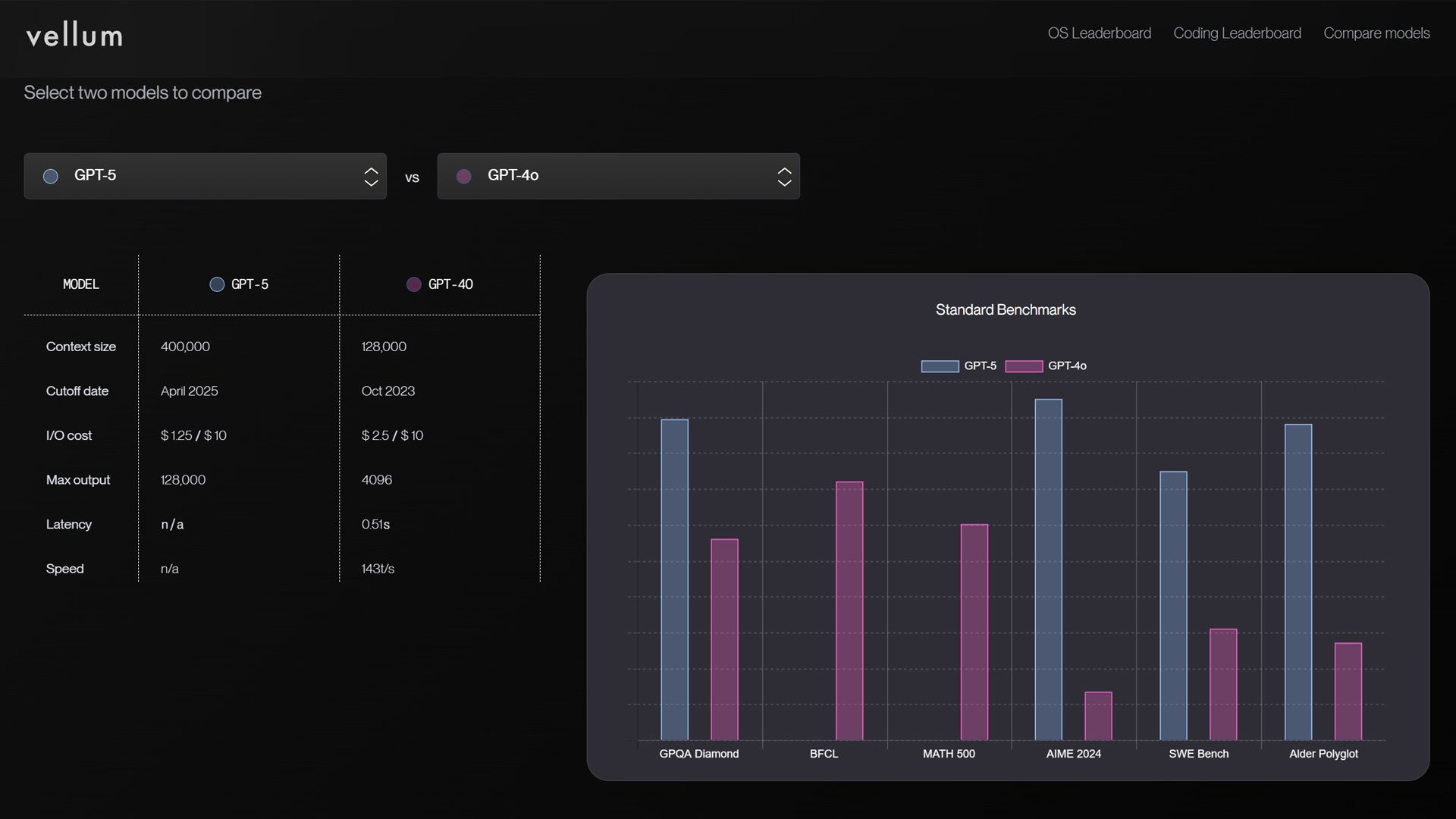ChatGPT users revolt over GPT-5 release — OpenAI battles claims that the new model's accuracy and abilities fall short
OpenAI has capitulated and reinstated older models, and promised not to kill them off again in the future.

OpenAI made a controversial move at the end of last week by replacing all of its older GPT-4 models with a single GPT-5 model, which it claimed was more accurate, more capable, and faster than ever before.
Although some users have highlighted its impressive response times and ability to pass certain technical tests, users have revolted, claiming it's lost some creative spark, frequently provides inadequate responses, deliberately avoids emotional and sensitive topics, and performs significantly worse than its predecessors.
It's been such a backlash that OpenAI quickly re-added the previous flagship 4o model, though only for paying subscribers. It has also introduced an "auto," "thinking," "fast," and "pro" mode for users of the new model.
OpenAI launched GPT-5 with high hopes, describing it as the "best AI system yet," capable of "smart, efficient" reasoning and responses. OpenAI claims that the model listens to user intent and adjusts its responses accordingly, with a built-in "router" that could look for errors and make it more refined, with mini versions of the model taking over if usage limits are ever too high.
It was supposed to be better for coding, better for business, better for creativity, but the user response suggests it's anything but.
A quick glance at the ChatGPT subreddit shows that it's filled with complaints about how poor GPT-5's responses are. Some highlight its limited emotional range, responding to the news of the death of a loved one with recommendations for funeral homes. In comparison, GPT-4 variants were almost overly emotional and verbose, which is perhaps something OpenAI had hoped to clear up with this new model.
The company certainly still believes it's a very capable model. OpenAI CEO Sam Altman has been retweeting various individuals claiming that GPT-5 just doesn't hallucinate like older models did.
Indeed, by the numbers, GPT-5 should be extremely capable. Vellum's various AI benchmarks have GPT-5 as top of the chart for Maths and Reasoning, and very competitive in a range of others (typically ahead of previous standout models like 4o and 3o).

Our sister site, Tom's Guide found GPT-5 to be impressive in its testing, highlighting that it beats Google's Gemini 2.5 in a range of text-based prompt outcomes.
But despite positive feedback from some sources, the complaints from users are very real and growing ever more numerous.
Sam Altman: With GPT-5, you'll have a PhD-level expert in any area you needMe: Draw a map of North America, highlighting countries, states, and capitalsGPT 5:*Sam Altman forgot to mention that the PhD-level expert used ChatGPT to cheat on all their geography classes... pic.twitter.com/9L9VodXll1August 10, 2025
Some of GPT-5's errors, which have been widely shared online, make the model look poor. This highlights that even if it makes errors in certain tasks less frequently, GPT-5 is still very capable of falling on its face. Crucially, like older models, it also doesn't seem to realise that it's made any kind of mistake.
That makes Altman's boundless enthusiasm for this release all the more surprising. The OpenAI CEO hinted that the company was approaching the Artificial General Intelligence (AGI) landmark, which many companies claim is the holy grail of AI development.
GPT-5 doesn't appear anywhere near that, and is arguably less impressive than its predecessors, since it should be more capable. For many users, that just doesn't appear to be the case. The release of GPT-5 is raising questions about whether AI development is plateauing.
For many users, though, that conversation isn't interesting. They just want their old models back. A petition quickly sprang up following the launch of GPT-5, which demanded that OpenAI keep GPT-4o available for users.
OpenAI did acquiesce to that one, though it has locked 4o behind its subscription paywall for now.
But it's not about to admit any major fault just yet. Although Altman said (via SiliconRepublic) that GPT-5 was behaving in a "dumb" way recently, which he claims is now fixed. He also alluded in personal posts on Twitter/X that users were potentially using the model wrongly, and were too attached to AI models and personalities.
"People have used technology including AI in self-destructive ways; if a user is in a mentally fragile state and prone to delusion, we do not want the AI to reinforce that," he said in a Twitter/X post. "Most users can keep a clear line between reality and fiction or role-play, but a small percentage cannot. We value user freedom as a core principle, but we also feel responsible in how we introduce new technology with new risks."
However, those personal thoughts aside, OpenAI has expanded options for GPT-5 and increased messaging limits for the more capable "Thinking" version. OpenAI is also said to be working on a new, warmer version of GPT-5, but without dipping into the sycophantic behaviour that characterized GPT-4o at times.
Updates to ChatGPT:You can now choose between “Auto”, “Fast”, and “Thinking” for GPT-5. Most users will want Auto, but the additional control will be useful for some people.Rate limits are now 3,000 messages/week with GPT-5 Thinking, and then extra capacity on GPT-5 Thinking…August 13, 2025
It's also reinstating older models, making the drive for a singular GPT-5 feel a bit redundant, even if it is likely to please fans who have a specific attachment to the flavor of an older model.
Despite the launch of GPT-5, OpenAI has an uphill battle to fight in the weeks and months ahead. Despite managing to top the charts of several AI benchmarks, something isn't landing well with users. With updated models from big-hitters like Anthropic, Meta, and more surely on the horizon, OpenAI may be vulnerable to a loss of market share in the competitive AI thunderdome.
ChatGPT may be a household name for now, but if it can't keep public sentiment on its side, competitors could edge out the supposedly leading GPT-5 model.
Follow Tom's Hardware on Google News to get our up-to-date news, analysis, and reviews in your feeds. Make sure to click the Follow button.

Jon Martindale is a contributing writer for Tom's Hardware. For the past 20 years, he's been writing about PC components, emerging technologies, and the latest software advances. His deep and broad journalistic experience gives him unique insights into the most exciting technology trends of today and tomorrow.
